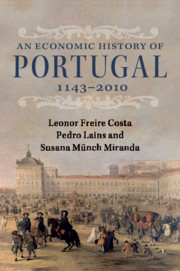Book contents
- Frontmatter
- Contents
- List of figures
- List of maps
- List of tables
- Preface
- Introduction
- 1 The medieval economy, 1143–1500
- 2 The age of globalization, 1500–1620
- 3 War and recovery, 1620–1703
- 4 The Atlantic economy, 1703–1807
- 5 The rise of liberalism, 1807–1914
- 6 Patterns of convergence, 1914–2010
- Conclusion
- References
- Index
6 - Patterns of convergence, 1914–2010
Published online by Cambridge University Press: 05 May 2016
- Frontmatter
- Contents
- List of figures
- List of maps
- List of tables
- Preface
- Introduction
- 1 The medieval economy, 1143–1500
- 2 The age of globalization, 1500–1620
- 3 War and recovery, 1620–1703
- 4 The Atlantic economy, 1703–1807
- 5 The rise of liberalism, 1807–1914
- 6 Patterns of convergence, 1914–2010
- Conclusion
- References
- Index
Summary
The main feature of the Portuguese economy in the twentieth century was both a rapid transformation and a slow but consistent catching-up to the living standards of the European forerunners. The convergence of the Portuguese income per capita and productivity levels commenced soon after the end of World War I and continued throughout the Republican regime, which lasted until 1926, in spite of the high levels of political instability. During those early years, economic growth was to a large extent linked to tariff protectionism and to direct state intervention in the economy. That process was not unique to Portugal, as it occurred in most of the poorer European periphery, where rates of economic growth increased to unprecedented levels. World War II led to an inevitable halt in economic growth, but Portugal's neutrality spared the country deeper consequences and created opportunities for the expansion of a few economic sectors, namely those linked to exports. The post–World War II years were the best ever for the Portuguese economy, which saw levels of income and productivity converge faster with those recorded in Europe's most advanced countries, namely in the major industrial powers. This convergence trend was shared by most peripheral countries in Europe, regardless of their political regime, and lasted until 1973. During the golden years or growth, Portugal and the rest of Europe had economic policies which tended to foster a greater opening to the outside, and a greater presence of the state in the economies. In terms of the structure of the economy, faster growth led to a swift industrialization of the country, an increase in the weight of the services sector, a decline in the importance of agriculture, and an increase in the weight of foreign trade, and higher participation of foreign capital in national investment.
Political discontent and the colonial wars led to yet another revolution, in 1974, which immediately followed the year of the international crisis caused by the end of the Bretton Woods system and the soar in oil prices in the world markets. A period of political instability ensued, lasting until 1976 or 1977, and in this year Portugal applied to join the European Communities, which it eventually did in 1986.
- Type
- Chapter
- Information
- An Economic History of Portugal, 1143–2010 , pp. 291 - 344Publisher: Cambridge University PressPrint publication year: 2016



